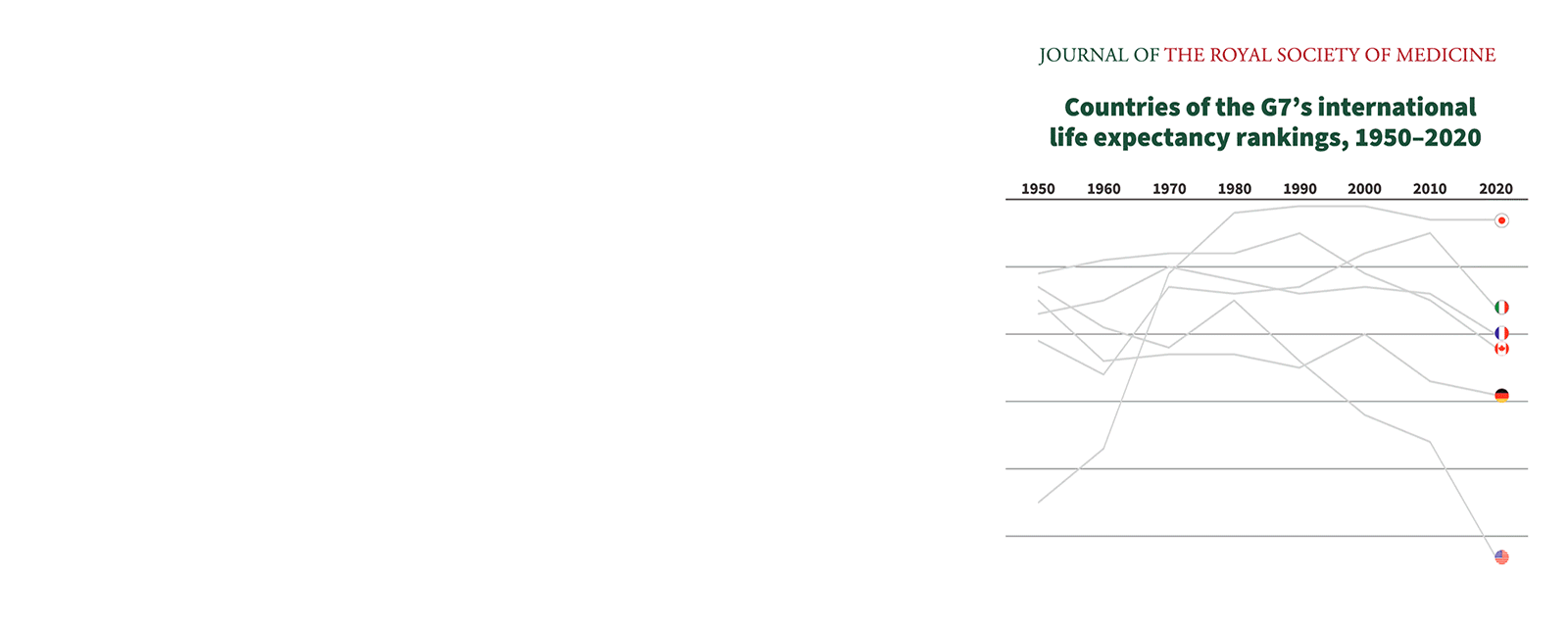
UK’s fall down global ranks for life expectancy explained
A new analysis published by the Journal of the Royal Society of Medicine [1] highlighted a decades-long UK decline in life expectancy rankings. The analysis received wide-spread attention from health and science journalists writing for UK national media. One of the researchers, Professor Martin McKee*, explains why the UK has fallen down the global ranks for life expectancy and warns that we ignore the worsening health of our population at our peril
For those living in Britain the 1950s began well. The country was rebuilding, physically and economically, after the devastation of a World War. A new welfare state was emerging, with policies to tackle Beveridge’s five giants, idleness, ignorance, disease, squalor and want. The Festival of Britain celebrated achievements in science and the arts. And a new Queen was on the throne, her coronation coinciding with the ascent of the world’s highest peak by a British-led team of mountaineers. Many would agree with Harold Macmillan, who became Prime Minister at the end of the decade, that they had “never had it so good”.
But looked at from beyond these shores, things were not looking so good. The country was humiliated by the ill-judged Suez affair. Germany, defeated in the war, was experiencing its Wirtschaftswunder, or economic miracle, at a time when the British manufacturing industry was struggling to compete in the global economy. In 1962 US Secretary of State Dean Rusk’s comment that the country had “lost an empire but not yet found a role” resonated with many.
So how has the UK fared since then? This is what three of us, Lucinda Hiam and Danny Dorling from the University of Oxford, and myself, have asked in a newly published paper in JRSM. And the answer is “not very well”.
Measuring the progress of nations
There are numerous ways of looking at the progress of nations. Many focus on the economy. Indeed, governments and international agencies devote enormous resources to capturing economic performance even though, as Robert Kennedy famously said, in 1968, that Gross National Product measures “everything … except that which makes life worthwhile”.
Yet for most people, what matters even more than money is health. And that typically gets rather less attention in political discourse. For us, however, it was important. In a series of recent papers, several also published in JRSM, we have been warning about stagnation and, at some ages, declining life expectancy in the UK. Indeed, for the past decade or so, we have trailed at the bottom of the international rankings, along with the USA. Yet even we were surprised by what we found.
Analysis over seven decades
We started in 1950 and followed the data for 70 years until 2021, the most recent year available to us. Back then, things were indeed good. In 1950 the UK ranked 10th in the world in life expectancy at birth, well above France, at 17th. By 1952, when the late Queen ascended the throne, things were even better and the UK had risen to 7th position. Things continued to go well during the 1950s and the UK entered a new decade in 8th position. After that, however, things went steadily downhill. By 2010 it was in 26th position and, by 2020, in 36th.
Maintaining a relatively high ranking was always going to be difficult. Some countries still suffering wartime devastation, such as Japan, had much more scope for improvement, helped by their own economic miracles. So, it is no surprise that Japan, along with some of its Asian neighbours, has done so well. In the 30 years after 1950 Japan moved from 45th to 1st position and is now 3rd overall. But France, which like the UK benefitted from the wealth that came with being a colonial power, has only fallen to 20th and is now much higher than the UK.
Lessons from history
This should be deeply worrying. I’ve spent much of my career studying the health of nations. Throughout the 1990s I was seeking to understand what is commonly called the post-communist mortality crisis in countries of Central and Eastern Europe and the former USSR. Back in the 1980s many western commentators were concerned that the USSR was overtaking the west. Especially in the USA, still smarting from defeat in Vietnam, it was easy to create a narrative that the west was in decline while the USSR was overtaking it, especially in its defence capability. Yet a small group of demographers who managed to get access to Soviet health data offered a different perspective. They could see that infant mortality was rising and suggested that this showed that all was not what it seemed. And as we now know, they were right. Within a decade the USSR would cease to exist.
Since then, I’ve worked with colleagues on a series of papers, including the Brexit vote, 1920s Italy, and 1930s Germany. All show that communities experiencing worsening health create fertile ground for populist politicians who exploit divisions in society by attacking minorities. Jacob Bor showed the same with the 2016 US Presidential election. This is profoundly disturbing.
The UK lacks many of the safeguards that exist in other countries, such as a written constitution and a supreme court that can uphold core concepts such as human rights. Recent events in Israel, one of a handful of other countries that similarly lacks a codified constitution, offer a warning.
The lessons of history are clear. We ignore worsening health of our population at our peril.
* Martin McKee is Professor of European Public Health at the London School of Hygiene & Tropical Medicine and research director of the European Observatory on Health Systems and Policies
